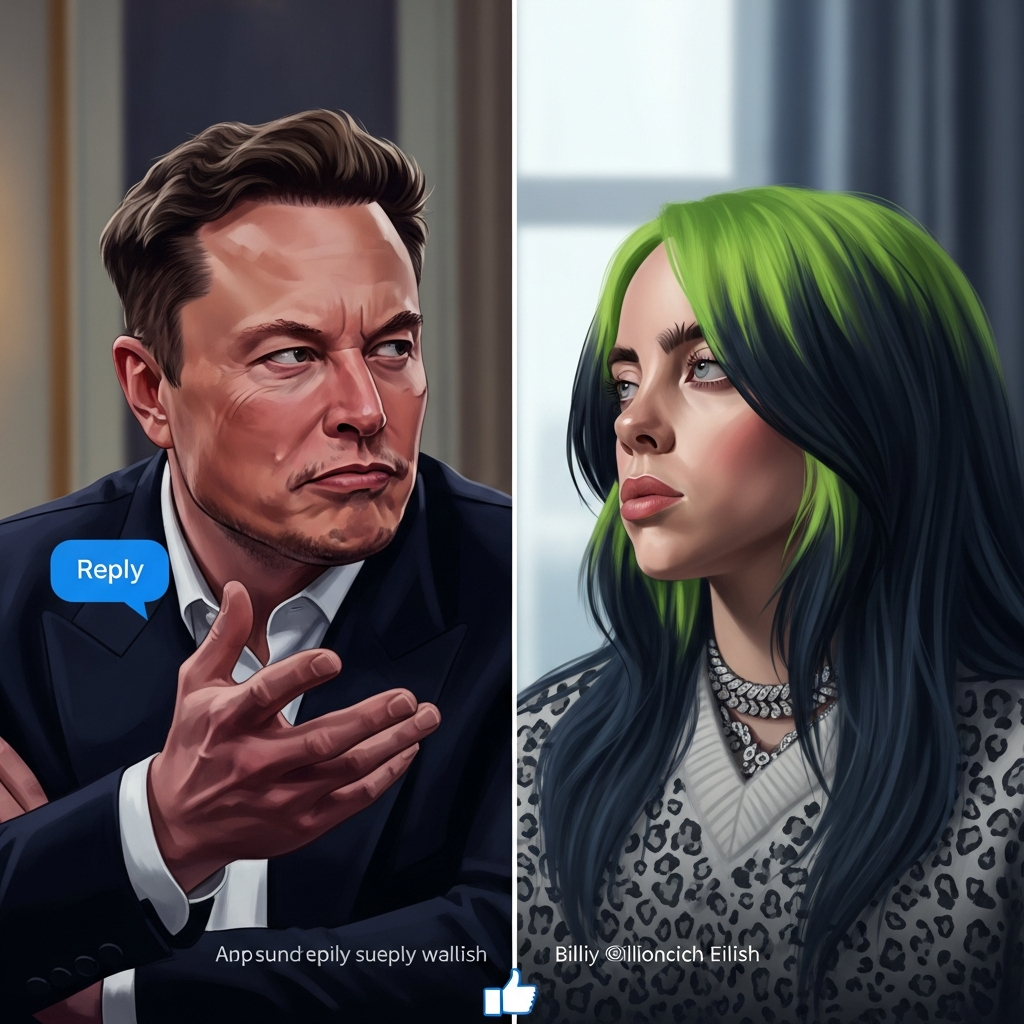An explosive online dispute has erupted between billionaire tech mogul Elon Musk and pop superstar Billie Eilish, drawing significant attention to the contentious issue of extreme wealth and social responsibility. The conflict ignited after Eilish launched a scathing critique of billionaires “hoarding wealth,” directly targeting Musk with strong accusations and specific proposals for redistributing his vast fortune. Musk, in turn, fired back, publicly dismissing Eilish’s intelligence, intensifying a debate that resonates far beyond celebrity circles.
Billie Eilish Ignites Controversy: Her Stance on Billionaire Wealth
The feud escalated following a series of Instagram stories shared by Billie Eilish, where she vehemently criticized the accumulation of extreme wealth. These posts, originally from the abortion-access activist group “My Voice, My Choice,” highlighted Elon Musk’s immense net worth and suggested tangible ways he could address global crises. Eilish amplified these messages, directly labeling Musk a “fking pathetic py bh coward” for his perceived inaction.
The activist posts, which Eilish reposted, referred to Musk as a “trillionaire.” This likely referenced a significant $1 trillion pay package approved by Tesla shareholders, a deal that could potentially elevate his net worth to that staggering sum within a decade. While Forbes currently estimates his fortune at less than half that amount, the perception of such wealth fueled the criticisms. The Instagram stories detailed how Musk’s wealth could be leveraged to tackle pressing humanitarian and environmental challenges. These included:
Ending World Hunger: Contributing $40 billion annually through 2030, a total of $200 billion over five years, could effectively eradicate world hunger.
Saving Endangered Species: Allocating up to $2 billion each year could safeguard all critically endangered species.
Rebuilding Gaza: His immense resources could facilitate the reconstruction of Gaza following massive destruction.
Ensuring Clean Water: Providing $140 billion per year for seven years could ensure universal access to safe, clean water.
Eilish’s actions underscore her consistent and outspoken stance against billionaires. Just weeks prior, she used her acceptance speech at the WSJ Magazine Innovator Awards to question the rationale behind extreme wealth accumulation. Addressing an audience that included prominent figures like Mark Zuckerberg and George Lucas, she challenged, “If you are a billionaire, why are you a billionaire? No hate, but give your money away, shorties.” This public appeal for greater philanthropic action and wealth redistribution set the stage for her direct confrontation with Musk.
Musk’s Retort: A Dismissive Online Strike
Elon Musk was quick to respond to Eilish’s pointed remarks. Via his social media platform X (formerly Twitter), Musk replied to a post summarizing Eilish’s Instagram criticisms. His terse and dismissive comment: “She’s not the sharpest tool in the shed.” This direct jab at Eilish’s intelligence further fueled the Elon Musk Billie Eilish wealth debate, transforming it into a high-profile exchange about wealth, privilege, and public responsibility.
Musk’s response was interpreted by many as a clear indication of his disinclination to engage with the kind of wealth redistribution Eilish advocates. The swiftness of his online retaliation highlights the often-volatile nature of celebrity disputes on social media. Neither Musk nor Eilish immediately offered further comment directly to news outlets following the exchange, leaving the public to interpret the implications of their digital clash.
The Broader Context of Celebrity Activism and Wealth Inequality
This Elon Musk Billie Eilish feud is not an isolated incident. It reflects a growing public discourse surrounding wealth inequality and the perceived moral obligations of the ultra-rich. Eilish has consistently used her platform to advocate for social and environmental causes, demonstrating her commitment through actions like donating $11.5 million from her “Hit Me Hard and Soft” tour proceeds to initiatives focused on food equity, climate justice, and carbon reduction. This personal commitment strengthens her credibility as a critic of wealth hoarding.
The Tesla pay package, which could theoretically make Musk the world’s first trillionaire, plays a crucial role in intensifying this debate. While his current net worth is substantial, the idea of an individual accumulating such an unprecedented fortune while global crises persist sparks outrage among many. Activist groups and public figures like Eilish argue that such vast sums could be transformative if directed towards societal good.
The incident also highlights the power of social media as a battleground for public figures. Platforms like X and Instagram provide an immediate, unfiltered channel for celebrities and billionaires to voice opinions and engage in direct, often confrontational, dialogue. This immediacy can amplify feuds, bringing complex issues like wealth redistribution into mainstream conversation at an accelerated pace. The public often becomes an active participant, forming opinions and engaging in discussions online.
Mark Zuckerberg’s reaction at the WSJ Innovator Awards further underscored the sensitivity of the topic. While Eilish’s remarks garnered “quiet laughter and applause” from many in the room, an eyewitness noted that Zuckerberg, present to support his philanthropic wife Priscilla Chan, did not join in the clapping. This subtle detail speaks volumes about the discomfort some billionaires may feel when directly challenged on their wealth.
Frequently Asked Questions
What sparked the feud between Elon Musk and Billie Eilish?
The feud was sparked by Billie Eilish’s strong criticism of billionaires for “hoarding wealth,” specifically targeting Elon Musk. Eilish shared Instagram stories that suggested how Musk’s immense fortune could address global issues like world hunger and rebuilding Gaza. She amplified these posts with direct insults towards Musk, labeling him a “fking pathetic py bh coward.” Musk retaliated by dismissing Eilish’s intelligence on X (formerly Twitter), stating, “She’s not the sharpest tool in the shed.”
Where did Billie Eilish originally voice her criticisms of billionaires?
Billie Eilish initially voiced her criticisms of billionaires during her acceptance speech at the WSJ Magazine Innovator Awards. In a room with prominent wealthy individuals like Mark Zuckerberg and George Lucas, she questioned the accumulation of extreme wealth and urged billionaires to “use (their money) for good things and give it to some people that need it.” She later escalated her direct critique of Elon Musk via a series of Instagram stories, which included posts from an activist group advocating for wealth redistribution.
What arguments are typically made for and against wealth redistribution in celebrity debates?
Arguments for wealth redistribution, as seen in Eilish’s stance, emphasize the moral obligation of the ultra-rich to address pressing global crises like poverty, hunger, and climate change, especially when unprecedented wealth exists alongside widespread suffering. Proponents argue that immense private fortunes could be transformative if directed towards public good. Arguments against, often implied by figures like Musk, typically focus on individual achievement, the complexities of wealth management, existing philanthropic efforts (often through foundations), and the potential economic disincentives of forced redistribution.
Conclusion: A Reflective Clash on Wealth and Responsibility
The Elon Musk Billie Eilish wealth debate serves as a high-profile microcosm of a much larger societal tension. It pits the immense accumulation of private capital against urgent global needs, forcing a conversation about social responsibility, philanthropy, and the very definition of success in an unequal world. While both figures are immensely influential, their online clash highlights contrasting philosophies on how extreme wealth should function within society. As public figures increasingly use their platforms to drive social commentary, such disputes are likely to continue, prompting renewed scrutiny of power, wealth, and moral obligation in the digital age.



